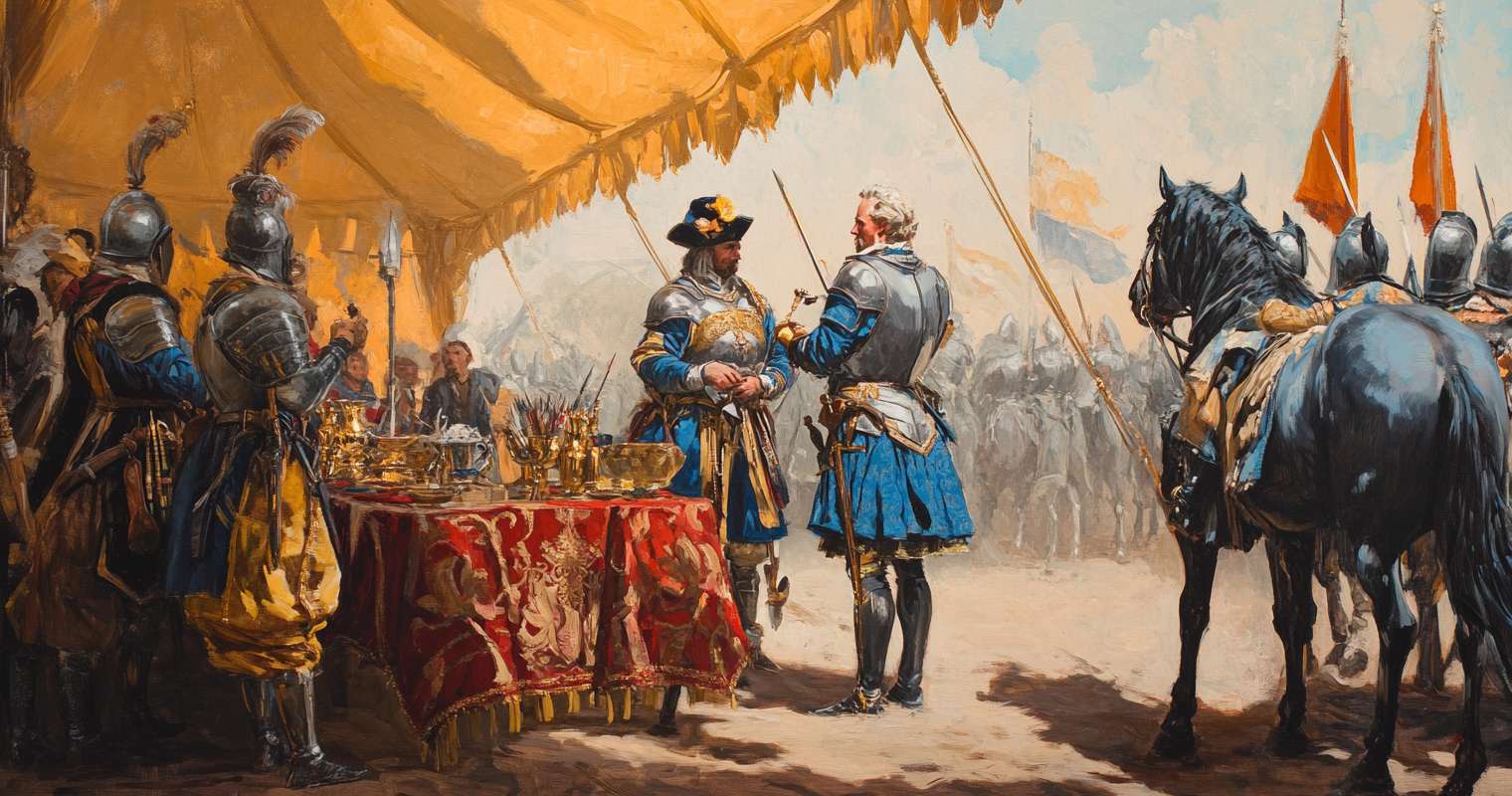
Overconfidence clouds the French camp in Henry V Act 3 Scene 7 Quiz—see if you remember their misguided boasts. Henry V Act 3 Scene 7 Quiz fans, get ready to explore one of the most arrogant and boastful moments in Shakespeare’s historical drama. As the English army faces exhaustion and overwhelming odds, the French nobility remain completely unaware of the threat they are about to face. This scene serves as a comedic yet revealing insight into the mindset of the French leaders, showing their arrogance, vanity, and misplaced confidence just before their devastating defeat at Agincourt.
The scene takes place inside the French camp, where the French nobles—the Constable of France, the Duke of Orleans, and the Dauphin—talk excitedly about the coming battle. The Dauphin, obsessed with his warhorse, boasts about its beauty, speed, and strength, describing it in overly poetic and exaggerated terms. His companions grow increasingly frustrated with his self-absorbed obsession, trying to shift the conversation back to the actual battle ahead.
The French are overconfident, but is that a mistake? Keep reading with Henry V Act 4 Scene 1 Quiz as the battle reaches a critical turning point. Want to see how the English army struggled beforehand? Revisit Henry V Act 3 Scene 6 Quiz. And for the ultimate challenge, test your knowledge with the Henry V Shakespeare Quiz!
Ready to Begin the Henry V Act 3 Scene 7 Quiz?
Henry V Shakespeare Quizzes: Think you know Shakespeare’s legendary king?
Summary of Henry V Act 3 Scene 7
The Constable and Orleans discuss the overwhelming advantage of the French army, convinced that the English are too weak and outnumbered to pose a real challenge. They joke about how easily they will defeat Henry’s forces, showing no real concern for strategy or discipline.
By the end of the scene, a messenger arrives, announcing that the English army is advancing. The French remain confident, expecting an easy victory, completely unaware that their arrogance will soon lead to disaster.
Key Themes in Henry V Act 3 Scene 7
Shakespeare explores overconfidence, vanity, and the dangers of underestimating one’s enemy. The French nobility display an almost laughable level of arrogance, contrasting sharply with Henry’s focused, disciplined leadership.
Another major theme is words versus actions. While the French talk endlessly about their own greatness, Henry and his men are preparing for the realities of war. This contrast builds dramatic tension, making their impending defeat even more powerful.
Shakespeare’s Use of Language and Humor
- The Dauphin’s speech about his horse is so exaggerated and poetic that it becomes almost comical, highlighting his vanity and detachment from reality.
- The Constable and Orleans’ dialogue is filled with boastful remarks and dismissive comments about the English, reinforcing their misplaced confidence.
- Dramatic irony is central to this scene—the audience knows that the French will lose, making their arrogance seem even more foolish.
The Historical Context of Act 3 Scene 7
Before the Battle of Agincourt, historical accounts describe the French as overconfident, believing that their superior numbers and heavily armored knights would easily crush the English. Shakespeare amplifies this arrogance for dramatic effect, showing how pride and underestimation can lead to downfall.
Are You Ready for the Henry V Act 3 Scene 7 Quiz?
Think you understand why the Dauphin is obsessed with his horse, how the French leaders dismiss the English threat, and how Shakespeare builds dramatic irony? Do you remember how the French react when they hear the English are advancing?
This Henry V Act 3 Scene 7 Quiz will test your knowledge of Shakespeare’s use of humor, arrogance, and foreshadowing. Take the quiz now and see if you can analyze how overconfidence leads to defeat!
What Happened – Henry V Act 3 Scene 7
The scene is set in the French camp near Agincourt. The Constable of France, the Duke of Orleans, and the Duke of Bourbon are present. They discuss their horses and armor. They boast about their strength and readiness for battle. The Constable praises his horse. Orleans agrees, claiming his horse is the best. Bourbon joins in, speaking highly of his own horse. The French nobles continue to talk about their equipment and eagerness to fight.
The Constable expresses confidence in their victory. He believes the French will easily defeat the English. Orleans and Bourbon share his optimism. They feel certain of their success in the upcoming battle. The group continues to exchange compliments about their horses and gear. Their conversation is full of pride and certainty.
The scene ends with the French nobles preparing for the fight. They are confident and excited. They expect a quick and easy victory over the English forces.
Henry V Act 3 Scene 7 – Quotes
- “By God, I am afraid the people will choose Sir Thomas Erpingham!” – {Pistol}, ‘In jest, mocking the choices of leadership before battle.’
- “He is simply the most active gentleman of France.” – {Constable}, ‘Praising the Dauphin’s prowess and eagerness for battle.’
- “I think he will eat all he kills.” – {Orleans}, ‘Sarcastically commenting on the Dauphin’s confidence and appetite for victory.’
- “The Duke of Exeter is as magnanimous as Agamemnon.” – {Duke of Bourbon}, ‘Admiring the nobility and grandeur of Exeter.’
- “Give me any gage of thine, and I will wear it in my bonnet.” – {Bardolph}, ‘Offering a token of friendship and allegiance in the face of war.’
- “Would it were day!” – {Constable}, ‘Expressing impatience and eagerness for the battle to begin.’
- “I think the night will turn to rain.” – {Orleans}, ‘Speculating about the weather, symbolizing the uncertainty before the conflict.’
- “We shall be charged again.” – {Duke of Bourbon}, ‘Anticipating the coming battle and the need to be prepared for action.’
- “I will arm me bravely.” – {Pistol}, ‘Resolving to face the impending battle with courage.’
